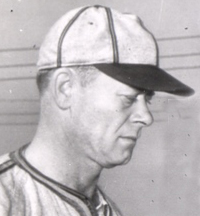| Sig Jakucki | |
|---|---|
 | |
| Pitcher | |
| Born: August 20, 1909 Camden, New Jersey, U.S. | |
| Died: May 29, 1979 (aged 69) Galveston, Texas, U.S. | |
Batted: Right Threw: Right | |
| MLB debut | |
| August 30, 1936, for the St. Louis Browns | |
| Last MLB appearance | |
| August 29, 1945, for the St. Louis Browns | |
| MLB statistics | |
| Win–loss record | 25–22 |
| Earned run average | 3.79 |
| Strikeouts | 131 |
| Stats at Baseball Reference | |
| Teams | |
| |
Sigmund Jakucki (August 20, 1909 – May 28, 1979), nicknamed "Sig" or "Jack",[1] was an American pitcher in Major League Baseball who appeared in 72 games over all or part of three seasons (1936 and 1944–1945) for the St. Louis Browns. He is best known for defeating the New York Yankees, 5–2, in the final game of the 1944 regular season to clinch the American League (AL) pennant for the Browns, their only AL championship.[2] A hard-throwing right-hander, he was listed as 6 feet 2 inches (1.88 m) tall and 198 pounds (90 kg).
A Camden, New Jersey, native, Jakucki relocated to Galveston, Texas, in 1934. Formerly a shortstop and outfielder, it was in Galveston where he became primarily a pitcher. He first pitched with the Browns in 1936 but failed to make their roster in 1937 and stopped playing professionally after 1938. However, due to a shortage of available players during World War II, the Browns sent him a letter inviting him to 1944 spring training. He made the roster and threw four shutouts as the Browns bested the Detroit Tigers in the pennant race. He started Game 4 of the 1944 World Series against the St. Louis Cardinals but took the loss, as the Cardinals ultimately won the series in six games. Jakucki was the Opening Day starter for the Browns in 1945 but was suspended from the team in September after showing up drunk to a team train ride. He pitched two more seasons in the minor leagues, then returned to Galveston, where he spent the rest of his life. He was well known for his penchant for alcohol, as well as his combative nature.